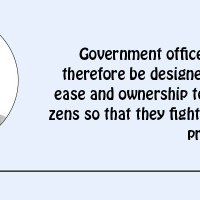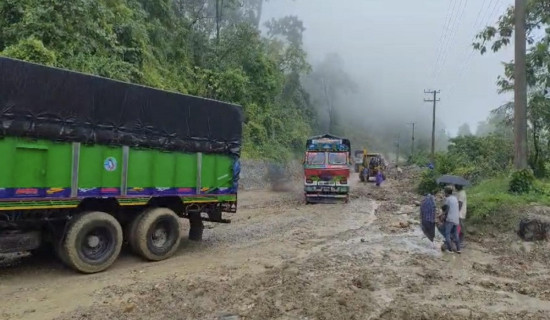- Thursday, 30 October 2025
Death Of An Entrepreneur
The agonising death of Prem Prasad Acharya has shaken the country to the core. His decision to take his own life in a fit of failure and frustration can hardly be accepted in the modern society but what he expressed in his long suicide note reveals his relentless struggle as well as the pathological conditions of many state mechanisms that are not cooperative to a genuine, diligent and enthusiastic citizen to be a successful entrepreneur. As he mentions, his investment, hard work and commitment to running his travel business and agro industry went down the tubes because he was duped and discouraged in every step of his venture. He appears to be a Sisyphean character condemned to chivvy from pillar to post.
Then, after several attempts of suicide, he immolated himself before the parliament building in Baneshwor, to draw attention of public and government to his plight and problems. There is outpouring of sympathy and financial support for the deceased family members. At the same time, the people from different walks of life, including political leaders and civil society members, have vented their ire over the conditions that led Acharya to finish himself off. In response to the public outrage, the government has formed a taskforce to study the issues raised by late Acharya. Can it trace the root causes that failed Acharya and provide solution to them?
Accusation
Despite his ‘cowardly’ act of taking his own life, late Acharya has raised pertinent issues that an energetic businessman faces in course of establishing and conducting a small enterprise in the country. He offers a list of 25 suggestions to ensure rule of law, good governance and an atmosphere conducive to ply one’s trade without any hassle. He accused an array of companies, business firms and government offices - which include Bhatbhateni, Nepal Gramodhyog, Golyan Agro, Dabur Nepal, Big Mart, Sathimart, Merotarkari.com, NEP EXPRESS UAE, Suzuki showroom, Kathford College, Saan International and Sun Nepal Life Insurance Company - of ‘looting’ him.
He states, “This country’s system is thoroughly corrupt, so there is no motivation, everyone is in frustration, there is policy level fault.” This is a serious allegation that demands a thorough investigation and the plugging of systemic loopholes. Political leaders and activists have also echoed Acharya’s anti-state diatribes. For example, Nepali Congress general secretary Gagan Thapa said that the incident marked the failure of Nepali state mechanisms, system and those who run this system. NC central committee member Dr. Shekhar Koirala said that Acharya’s immolation has brought shame upon the state.
Acharya has rightly pointed out the erroneous policy and systemic malaise, and questioned the inability of the state apparatus to monitor and regulate those businesses and government mechanisms involved in cheating, bribery and other assorted frauds. But NC leaders Thapa and Koirala have failed to detect entrenched symptoms that have roiled the country for decades. The fundamental problem that late Acharya raised is the deregulation of the corporate houses, which is rooted in the neoliberal policy that the country has adopted and practiced since mid-1990s.
Neoliberal policy ‘reduces state functions to those of a minimal state’. Canadian author Naomi Klein highlights three components of neoliberalism – ‘privatisation of the public sphere, deregulation of the corporate sector, and the lowering of income and corporate taxes, paid for with cuts to public spending.’ Deregulation removes market restrictions and promotes healthy competition only when the market is self-sustaining and its players are honest and efficient. Otherwise, it creates a ground for freewheeling private corporations to pester and swindle suppliers and customers as mentioned by late Acharya.
Nepal’s experiment with neoliberalism has been disastrous as it has weakened real economy and engendered comprador class, bichauliya (middlemen) and rent-seeking culture. Its practice is like putting the cart before the horse – profit-making public enterprises were privatised and ultimately closed down, and youths who are the future of nation were sent abroad for jobs. The governments of all hues and shades boast of forging labour agreements with foreign governments but are least concerned about setting up industries locally to generate employment and build resilient economy. Unilateral focus on trade has turned economy import-based, not export-oriented, with remittances, sent by Nepali migrant workers, giving lifeline to the entire financial system. Tax payers’ money is largely funnelled to meet the administrative costs while the country has to mostly rely on foreign loans, aid and grants for development budget.
Monopoly
The public goods such as health, education and transportation facility have become costly because they are in the hands of private sector that exercises monopoly and cartel, as regulating bodies are not strong and resourceful to rein in their illegal and arbitrary acts. Neoliberal policy, adopted as per the Washington Consensus, has amplified the country’s dependency, virtually making it a banana republic. Some left analysts even go on to claim that the botched-up privatisation aims to shut the industries established with the aid of socialist nations such as former Soviet Union and China to reduce the latter's influence on Nepali populace and society.
In his comment on the tragic demise of Acharya, NC leader Thapa has said there is the need for a resolution to repair the system in order to ensure justice for working class people as normal fixing of any one aspect does not rectify it. But the question is – Is the NC ready to review and reverse faulty neoliberal policy that fails and pushes to depression many entrepreneurs like Acharya? The NC has championed neoliberalism but remains lackadaisical to address the ills it has spawned. The current system can be repaired only when the privatisation of public sector economy is stopped, corporate businesses are strictly regulated and spending on public works is considerably increased.
(The author is Deputy Executive Editor of this daily.)

















